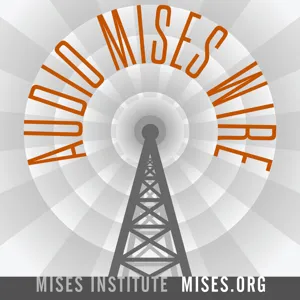Podcast Summary
Libertarian populism: Libertarianism evolved into a populist movement, aligning with historical figures like Huey Long and Teddy Roosevelt, to adapt to the changing political landscape and represent themselves beyond third party constraints
The political landscape has seen a shift towards populism, even among libertarian movements. Murray Rothbard, a key figure in libertarian thought, established a realignment based on sovereignty rather than bipartisanship. This trend, which began with Brexit, has led to a reevaluation of political identities. While some libertarians were embraced by the mainstream, others were left out in the cold. The Libertarian Party found acceptance, but the Mises Institute stood alone in its opposition to statism. This cycle of being co-opted by the status quo was a challenge for libertarians, who saw themselves as inheritors of a legacy from figures like H. L. Mencken and Albert J. Nock. Populism became a new part of their identity, allowing them to represent themselves beyond the constraints of third parties. However, this new identity put them in an unusual alliance with historical figures like Huey Long and Teddy Roosevelt, who, despite their centralized power, were closer to a populist model than post-war era conservatives or New Deal Democrats. The transvaluation of values was necessary for libertarians to adapt to this changing political landscape.
Argentina's Populism Co-optation: Despite seeming to challenge the political establishment, Argentine populism was co-opted by conservatives through empty promises and elections, rather than genuine dialogue. The decline of institutional support and self-destructive conviction toward cultural homogenization in democracy also contributed to this phenomenon, but a full understanding of populism's genealogy is needed to move forward.
The rise of populism, while appearing to challenge the political status quo, has often been co-opted by the political establishment. The discussion highlights the case of Argentina and the seemingly paradoxical support it received from conservatives, despite the Cold War-era political dialectic that has dominated Latin America. The author argues that this support was more about the right words and securing elections, rather than contributing to the genuine dialogue of national populism. The text also touches upon the decline of institutional support and the self-destructive conviction toward cultural homogenization in democracy. However, it's important to note that these criticisms don't fully explain the genealogy of morals within populism. Instead, the author suggests that the revolution that allegedly enacted regime change left the Cold War talking points intact, resulting in a repetition of the same rather than the end of history. To move forward, the author emphasizes the importance of learning from earlier lessons and being aware of the commercialization and toothless nature of modern populism. As James Burnham pointed out, the real obstacle in politics for those interested in domestic regime change is the collaboration between progressives and Republicans, leaving the few without access to genuine populism. With this in mind, the media excitement surrounding a new right in various regions is not surprising.
Populism and Libertarianism: Populism and libertarianism can coexist, but it's crucial to avoid managerial capture, relativism, and monolithic public opinion. Localism offers a way to protect libertarian identity and navigate complex political landscapes.
The conservative and populist movements, fueled by anti-establishment sentiment, continue to evolve and present opportunities for assimilation into the mainstream. However, it's crucial to remember the potential for managerial capture and the dangers of relativism and a monolithic public opinion. The ongoing battle for grassroots populism requires critical thinking and a commitment to avoiding the pitfalls of the past. As Rothbard warned, libertarians must remain vigilant against media-sponsored populism and the ruling class's attempts to sabotage their movement. The philosophy of localism offers a way to protect against managerial interference and maintain libertarian identity. Ultimately, the lessons from the past provide valuable guidance for navigating the complexities of contemporary political landscapes. For further insights, visit Mises.org.

